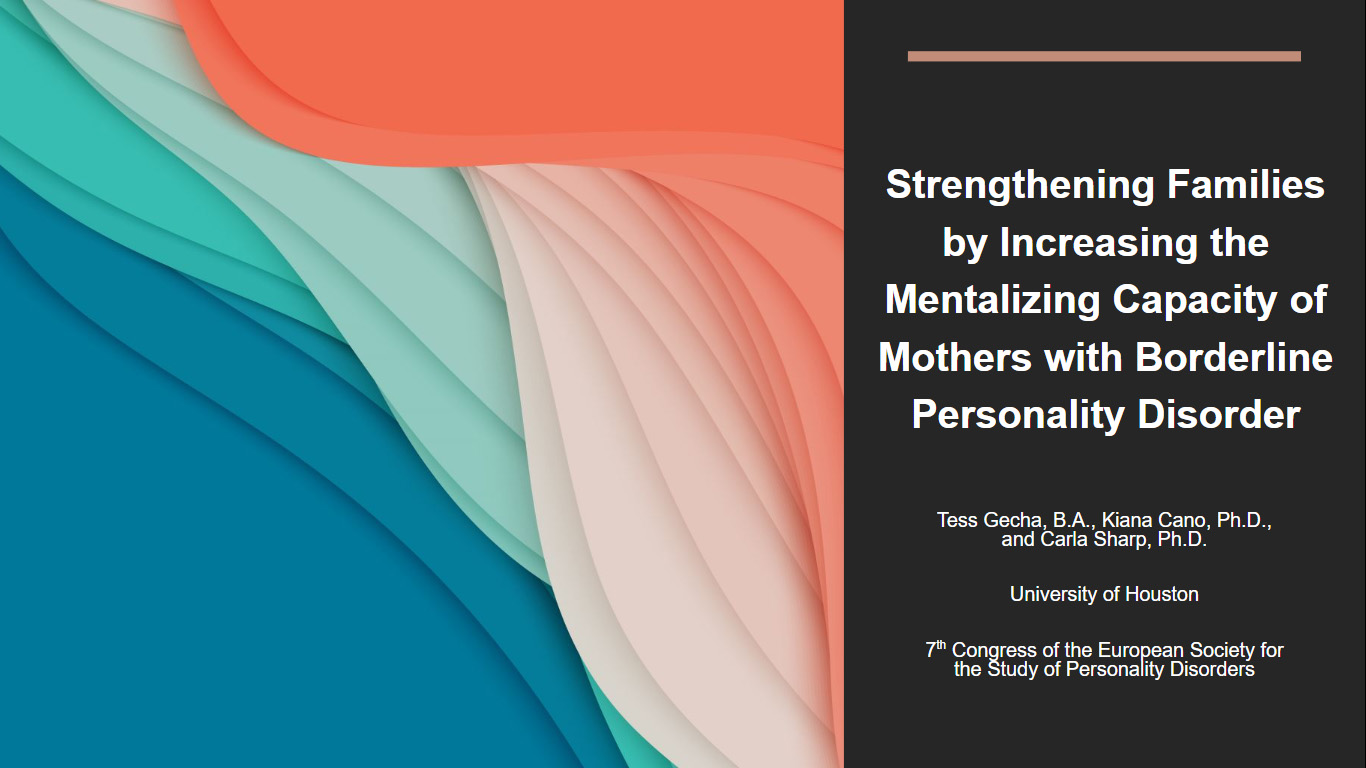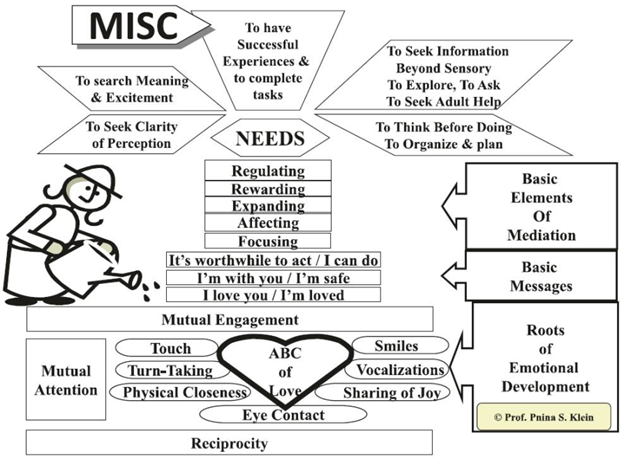MISC (Mediational intervention & Sensitizing Caregivers)
MISC Overview

What is MISC?
MISC was originally developed by Dr. Pnina Klein (1996) for low-resource and high-risk environments in which attachment disruption has occurred. “MISC” is a dual acronym describing both the process (Mediational Intervention for Sensitizing Caregivers) and the objective (More Intelligent and Sensitive – or Socially competent – Children). The theoretical underpinnings of the intervention are drawn from attachment theory (Bowlby, 1973) and Feuerstein’s (1979) theory of cognitive modifiability and mediated learning experiences (MLEs). The intervention aims to “sensitize” caregivers to the “literacy of interaction” – to be able to “read” and respond to the child’s emotional and learning needs. This is done by promoting a set of components or criteria within parent-child interactions that create learning moments (i.e., mediated learning experiences) and enhance the child’s cognitive, social, and emotional development. By engaging in these components, the caregiver slows down the interaction so that the child feels understood and supported and begins to learn to learn.

“What does MISC look like?”
MISC is a semi-structured, manualized video feedback intervention. Work with the caregiver is referred to as “training,” as it does not use an instructional, explicit teaching format. Training occurs in three basic modes. The first mode is individual video feedback sessions, during which the MISC “trainer” and caregiver reflect together on a video recording of an interaction between the caregiver and child, emphasizing behaviors and concepts related to the MISC components. The second mode is “in-service training,” for which the trainer is present during interactions between the caregiver and child and helps the caregiver implement MISC concepts in real time. The final mode consists of group meetings during which caregivers share their experiences with each other, fostering support as well as consolidation and expansion of caregiving skills. The standard structure is a yearlong with biweekly individual training sessions (24 sessions total). The intervention is lengthy because the aim is for the parent to internalize and generalize the core principles of caregiving. Additionally, MISC trainers do not require an advanced degree and no special tools or materials are required beyond the video clips, balancing the cost-effectiveness of the intervention.
“What is the benefit of MISC?”
The MISC components were defined based on theoretical and empirical support suggesting that specific characteristics of interactions between adults and children contribute to secure attachment relationships or affect children’s predisposition to learn. Specifically, the emotional components of MISC were defined to capture the fundamental affective and behavioral elements of a secure attachment relationship that are used in a variety of other psychodynamic and attachment-based interventions (Sharp, et al., 2020). In the 1980’s, the presence of mediational caregiver behaviors were found to predict cognitive outcomes in children better than the children’s own initial test scores and other relevant variables such as maternal education level (Klein et al., 1987). Other studies also demonstrated support for the importance of mediational behavior in the quality of both children’s cognitive (Klein, 1984; Klein et al., 1987) and socio-emotional development (Shuper Engelhard, Klein, & Yablon, 2013). The caregiver behaviors investigated by Klein and colleagues (1984, 1987) were later formally defined as the MISC mediational components.
Research on MISC utilizes the Observing Mediational Interaction (OMI; Klein, 2014) coding scheme to quantify both the emotional and mediational components. The mediational components are coded and tallied as they occur throughout video-recorded interactions, aligning with the video-feedback nature of the intervention itself. The OMI can be used to track changes in caregiving behaviors during and following MISC, providing a useful measure of both intervention processes and outcomes. While the OMI mediational components have demonstrated reliability and validity (e.g., Klein & Alony, 1993; Boivin et al., 2013a; Boivin et al., 2013b; Sharp et al., 2021), there is ongoing work to further validate the emotional components and to expand the measure for novel contexts, settings, and populations (Kerr et al., under review).
Since the development and introduction of MISC, several studies have been conducted that support its effectiveness. The first found that MISC led to increased maternal use of the MISC components and improved child outcomes, including scores on tasks of receptive vocabulary and verbal abstract reasoning, in 48 mother-infant dyads compared to 20 control dyads in a low-SES community in Israel (Klein & Alony, 1993). Similar results were found in randomized controlled trials (RCTs) in rural Uganda with 120 dyads with preschool-aged children with HIV/AIDS (Boivin et al., 2013a) and 119 dyads with uninfected HIV-exposed preschool-aged children (Boivin et al., 2013b). These results were then replicated in larger RCTs in Uganda with 221 HIV-exposed but uninfected 2 – 3-year-old children (Boivin, et al., 2017) and 120 HIV/AIDS-affected 2 – 5-year-old children (Bass, et al., 2017). Recently, a quasi-experimental feasibility trial conducted MISC with community-based organization careworkers, and orphans and vulnerable children ages 7-11, in South Africa and found that MISC increased the careworker’s use of emotional and mediational components, as well as improved youth mental health (Sharp et al., 2021).
MISC Projects (Ongoing and Completed)
Mediational Intervention for Sensitizing Caregivers (MISC) for Survivors of Domestic Violence (NIH funded)
- (Project leaders: Madeleine Allman & Nabeeha Asim)
- Following our research on MISC for children orphaned by HIV/AIDS in South Africa, we are now testing the feasibility, acceptability, and preliminary outcomes of this one-year mentalization-based intervention for mothers who have been victims of domestic violence. In this study, we are partnering with the Harris County Domestic Violence Coordinating Council to empower mothers in their relationships with their children. Our collaborators are Ms. Barbie Brashear, Dr. Julia Babcock, Dr. Julie McFarlane, Dr. Quenette Walton, and Dr. Ernest Jouriles.
- (Project leader: Madeleine Allman)
- This study leverages the existing NIH-funded adaptation and evaluation of MISC in an IPV rehousing program and uses a rigorous mixed-method approach to studying the implementation and sustainability of the intervention. This study is supported by an NIMH F31 grant awarded to Madeleine Allman.
Mediational Intervention for Sensitizing Caregivers for Community-based Organizations (MISC-CBO) (NIH funded)
- (Project leader: Bree Cervantes)
- This NIMH-funded study is a cluster randomized control clinical trial that will evaluate the effectiveness of a one-year mentalization-based intervention (MISC) in community-based organizations (CBOs) with caregivers who take care of orphans and vulnerable children (OVC) between the ages of 7 and 11 in South Africa. In this study, we are working with 24 local CBOs to empower careworkers in their work with OVC. We will also test cost-effectiveness and implementation readiness of MISC-CBO. Our collaborators are Prof. Lochner Marais, Dr. Michael Boivin, Dr. Felicia Wu, Dr. Jessica Sales, and Dr. Paulina Kulesz. Other valuable partners include Dr. Florence Tadi, Mr. Joe Serekoane. Ms. Kholisa Rani, Mr. Molefi Lenka, and Mr. Jan Cloete.
Completed
Mediational Intervention for Sensitizing Caregivers (MISC) in the context of reunification after separation due to migration (funded by UH internal grant)
- (Project leader: Carla Sharp)
- Yet a further extension of our MISC work includes a study with Dr. Jodi Berger funded by UH Internal Seed grant program with the aim of evaluating the feasibility and acceptability of MISC for parents and children who were separated through migration and currently undergoing migration. We work very closely with The Alliance as our community-based partner.
Mediational Intervention for Sensitizing Caregivers (MISC) for formerly incarcerated mothers (NIH funded)
- (Project lead: Sophie Kerr)
- The aim of this study is to assess the feasibility and acceptability of MISC for Black and Hispanic formerly incarcerated mothers and to identify targets for future adaptation of MISC for this population. The study uses a mixed methods design including quantitative surveys, qualitative interviews, and focus groups, and is informed by a Community Advisory Board. This study is funded by an NICHD F31 grant awarded to Sophie Kerr.
- (Project leader: Kiana Cano)
- In this study, which has been funded by a NIMH F31 awarded to Kiana Cano, we aim to evaluate the feasibility and acceptability of MISC for use with mothers with BPD. This project will lay the foundation for the successful adaptation of MISC for use with this population.
- (Project leader: Madeleine Allman)
- This study, funded by the NICHD, evaluates the feasibility and acceptability of a one-year mentalization-based intervention to children orphaned by HIV/AIDS in South Africa. In this study, we are partnering with NGOs and local Community Based Organizations to empower careworkers in their work with orphans. Our collaborators are Prof. Lochner Marais, Dr. Michael Boivin, Dr. Donald Skinner, Mr. Molefi Lenka, Mr. Joe Serekoane, and Dr. Cilly Shohet and Ms. Deborah Givon.